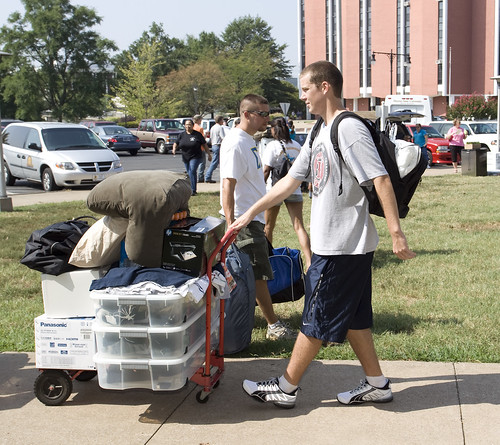I remember how exciting it was heading for university for the first time. In Mexico, most students still live with their parents, but I had the rare chance to go to a university away from home. So, I hugged my parents, got on the bus with my suitcase and my brown bag lunch, and headed for the adventure of a lifetime. I still made my way home almost every weekend, but every Sunday I headed back on the bus to learn and grow.
As thousands of 18-year-olds leave home for college this fall semester, most are looking forward to spreading their wings and, even if a little nervous, creating more independent lives. That includes making decisions about their financial lives. Parents can't be with them 24/7, nor should they be, but parents can talk to their students about what they can do to help protect their identities.
The folks at LifeLock suggest a few recommendations you may want to share with your kids:
Free Wi-Fi! Why Not? – Many campuses have free Wi-Fi services, which can be great for research or surfing, but when connected through a free Wi-Fi connection, it's important to know it is not always secure, and identity thieves may be able to see what you are doing online. Avoid social networking sites, online bill pay, financial accounts, and shopping online when connected via free Wi-Fi.
Be your own person: The Arizona Republic reports theft rings in China offer students fake IDs for sale which are often undetectable as fakes. These fake ID shops are covers for sophisticated identity theft rings. The report states,”Universities have become a prime target for fake-ID companies.” These rings are targeting college campuses because students are willing to pay a small fee as well as hand over personally identifiable information to get fake IDs. Best to follow the law and use your real identification. Creating a fake ID can cause more harm than good.
Credit – One Size Fits All – Consider relying on your credit card vs. your debit card. If you and your debit card are targeted, you could potentially lose the money you have in your bank account. If your credit card is compromised by a thief, you generally have 60 days to notify your financial institution and you won’t be out your direct checking and savings account funds.
Social NO, NO – Some schools may still use Social Security numbers as student identification numbers. If this is the case at your school, request a unique identifier be used instead of your Social Security number. Keep your Social Security card locked in a safe place where no one can access it.
Weekend Getaways: Near the end of each semester, email offers frequently arise for long-weekend vacations. Identity thieves can pose as trusted sources offering you the “deal of the day” if you just follow their link. Verify all offers by opening a new Web browser and typing in the official web address of a trusted site to confirm the authenticity of the offer.
Enjoy your last few days of Summer.
Photo Credit: Murray State
Disclosure: I’m a LifeLock Ambassador, this article is compensated. As always my comments and opinions are my own. Mama Latina Tips Information Purposes Legal Disclosure
- Creamy Coffee Flan Recipe - May 14, 2024
- Cantaloupe Agua Fresca Recipe - April 30, 2024
- Pineapple Agua Fresca Recipe (Agua de Piña) - April 27, 2024











